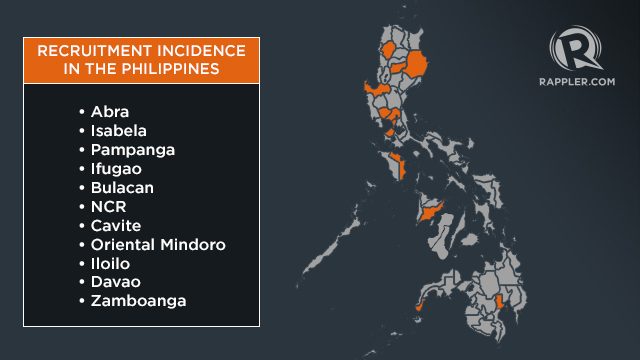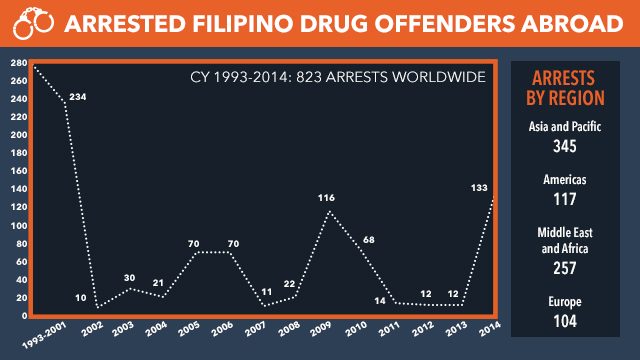SUMMARY
This is AI generated summarization, which may have errors. For context, always refer to the full article.

MANILA, Philippines – No different from terrorists, drug syndicates targeting potential drug couriers in the Philippines have resorted to social media, particularly Facebook and Twitter, to recruit new victims.
Members of these syndicates befriend vulnerable victims they meet via the Internet and even offer marriage proposals to seal the relationship.
Filipinos are particularly vulnerable because of their proficiency in English; their knowledge of other languages, of the Internet and computers; their “positive disposition” and their “unassuming behavior [which] acquires less attention from police or airport authorities,” an April 2015 report from the Philippine Drug Enforcement Agency (PDEA) said.
They become easy prey because of several factors: “poverty, poor educational background, easy money, unemployment, and the idea of traveling.”
Most of those recruited come from 4 provinces in the northern part of the country; two provinces in Central Luzon; 3 areas in southern Luzon; one province in the Visayas; and two provinces in Mindanao (see below).

To date, there are 820 Filipinos who have been charged with drug-related offenses worldwide, according to November 2014 data from the Migrant Workers’ Affairs Office of the Department of Foreign Affairs (DFA). Most of these Filipinos who were arrested were drug couriers.
Looking at cumulative data from 1993 to 2014, spikes in the number of arrests were recorded in 2009, with 116 arrests; and in 2014, with 133 arrests (see below).

From 1993-2001, a total of 234 Filipinos were arrested for drug-related offenses. The arrests in 2014 alone already amounted to more than half the arrests made over an 8-year period from 1993-2001.
In China, where most of the arrests were made from 1993-2014, (totaling 221), 119 Filipinos face fixed-term imprisonment (ranging from 20 years to one year), 72 face life imprisonment, 22 have been sentenced to death with a two-year reprieve, and 8 have pending cases under investigation.
Besides China which has sentenced to death 22 Filipinos, Vietnam and Indonesia have each sentenced to death one Filipino for drug-related offenses.
Mary Jane Veloso, who was arrested on April 25, 2010, was scheduled to be executed by firing squad past midnight Wednesday, April 29. She was spared at the 11th hour after pleas by President Benigno Aquino III and other interest groups, and the surrender of a woman who allegedly recruited Veloso.
Maria Kristina Sergio, accused by Mary Jane of duping her into transporting heroin to Indonesia, sought police protection following threats to her life. She has been brought to Camp Crame and is believed to be key to possible clemency that could be granted to Veloso.
Drug routes
DFA data showed that worldwide, comparing 2013 and 2014, the highest increase of drug courier incidence was recorded in the Middle East and Africa with 73.04%. Asia and the Pacific recorded an 8.88% increase, followed by Europe with 4%. Only the Americas listed a decrease of 13.43%.
In the Philippines, most of those who have been arrested (either as financiers, recruiters or pushers) have been found to be from West African countries, the PDEA report said.
Couriers coming from Ethiopia, Uganda, Ghana, and Guinea pick up drugs from either Ethiopia, Mali, or Morocco in West Africa then proceed to either Dubai or Abu Dhabi in the Middle East, where they take connecting flights to Asia – either the Philippines or Indonesia – to distribute the drugs.
Filipinos who are recruited as drug couriers are paid anywhere from “US$3,000-$15,000 for every successful transaction, depending on the amount of drugs to be delivered or the route to be traveled,” PDEA said. They are provided free plane tickets and hotel accommodations by recruiters.
African drug syndicates
Members of African drug syndicates are said to enroll as foreign students. Using their student cover, they court other female students and later on transform them into drug couriers themselves.
The PDEA report said African syndicate members also use Filipinos as recruiters to supply the syndicate with fresh drug-courier recruits for their networks in Bangkok, Macau, Peru, Sao Paolo, and Doha.
Cambodia and Singapore are also being tapped as transit points for the distribution of illegal drugs to other points in Asia. South America – particularly Brazil, Peru and Argentina – is another pick-up point for drugs on top of Africa – Nigeria, Ghana, and South Africa.
Drug couriers are made to conceal drugs in various ways, most likely upon instructions by members of drug syndicates. Besides hiding them in the lining, metal tubes, and bottom or side panels of luggages – as was the case with Veloso – drugs are also commonly wrapped in carbon paper, black garbage bags or aluminum foil to avoid being detected by airport X-ray machines.
In other instances, drugs are swallowed or hidden in clothes, leggings, and undergarments, concealed in toiletries or food packaging such as coffee, cereal, tea, or chocolate, among others.
In 2013, drugs were kept in milk carton boxes instead of the false compartment of luggages which was the most common practice in 2012. The new or distinct concealment methods include the “use of electronic equipment,” thread spools, and jute baskets, the PDEA report said.
The African drug syndicates, according to PDEA, already have ties with a local drug group in the country based on “luggage destination.” The report said this appears to be a “Muslim group” without providing further details. – Rappler.com
Conclusion: Drug groups tap persons with HIV as couriers
Man using computer image and cocaine addict image via ShutterStock
Add a comment
How does this make you feel?
There are no comments yet. Add your comment to start the conversation.